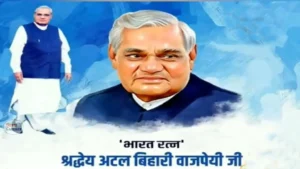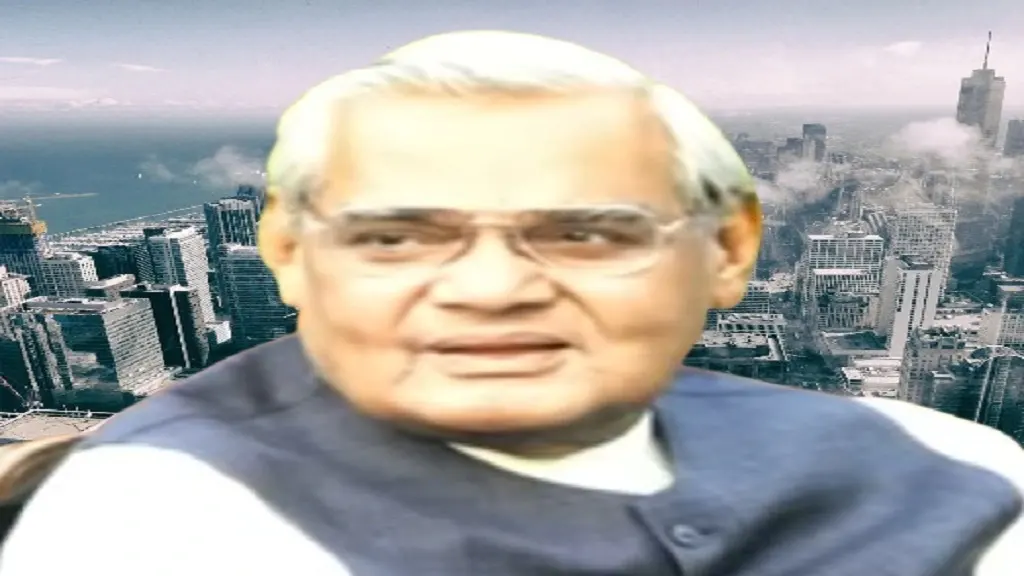Atal Bihari Vajpayee, a name that resonates with India’s economic transformation and political landscape. A visionary leader and the architect of India’s economic reforms, Vajpayee left an indelible mark on the nation’s development. From his early activist days, Atal Bihari Vajpayee faced challenges and emerged as a prominent figure in Indian politics. His influential tenure as Prime Minister showcased Vajpayee’s leadership, navigating through various challenges with resilience.
In this blog post, we delve into the life and achievements of Atal Bihari Vajpayee. Explore his journey from humble beginnings to becoming one of India’s most celebrated leaders. Join us as we uncover the milestones of his remarkable career and shed light on his contributions to India’s growth story. Let’s explore the legacy he has left behind in this insightful journey into the life of Atal Bihari Vajpayee – an extraordinary leader who shaped modern India!
Early Life and Education of Atal Bihari Vajpayee:
Born on December 25, 1924, in Gwalior, Madhya Pradesh, Atal Bihari Vajpayee grew up in a middle-class Brahmin family. From a young age, he exhibited exceptional oratory skills and an unwavering passion for literature. His education at Victoria College in Gwalior further nurtured his love for poetry and language.
Vajpayee’s journey into politics began during his college years when he joined the Rashtriya Swayamsevak Sangh (RSS), a nationalist organization. He actively participated in various socio-political activities and became deeply involved in the struggle to free India from British colonial rule.
After completing his graduation with distinction, Vajpayee pursued post-graduation studies in Political Science from DAV College Kanpur. During this time, he honed his political acumen by engaging with like-minded individuals who shared his vision of a strong and prosperous India.
Vajpayee’s academic pursuits laid the foundation for his future endeavors as a statesman. It was through these formative years that he developed not only intellectual depth but also empathy towards the struggles of ordinary citizens. These early experiences shaped Vajpayee’s perspective on governance and set him on a path to transform India’s economic landscape – marking just the beginning of an incredible journey that would leave an indelible mark on history.
Early Works of Atal Bihari Vajpayee as Activist:
In the early years of his life, Atal Bihari Vajpayee displayed a deep sense of activism and an unwavering commitment to social causes. As a young man, he joined the Quit India Movement in 1942 against British colonial rule. This was just the beginning of his journey as an activist.
Vajpayee’s passion for social change led him to actively participate in various movements and campaigns throughout his career. He played a crucial role in advocating for the rights and welfare of farmers, laborers, and marginalized communities.
His efforts extended beyond national borders as well. Vajpayee strongly condemned apartheid in South Africa and actively supported Nelson Mandela’s struggle against racial discrimination.
As an influential voice within the Bharatiya Jana Sangh (BJS), which later transformed into the Bharatiya Janata Party (BJP), Vajpayee worked tirelessly to promote democratic values and advocate for Hindu nationalism. His eloquence as a speaker made him stand out among his peers, capturing the attention of both supporters and critics alike.
Vajpayee’s activism not only shaped his political ideology but also laid the foundation for future reforms that would transform India’s economic landscape. His dedication towards improving people’s lives through grassroots mobilization set him apart from other politicians of his time.
Through his early works as an activist, Atal Bihari Vajpayee demonstrated immense determination and conviction in fighting for social justice. These experiences would ultimately shape his journey towards becoming one of India’s most respected leaders on both national and international platforms.
Early Political Career (1947–1975) Atal Bihari Vajpayee:
Atal Bihari Vajpayee’s journey into politics started soon after India gained independence in 1947. He joined the Bharatiya Jana Sangh, which eventually evolved into the Bharatiya Janata Party (BJP). Vajpayee quickly emerged as a prominent leader within the party, known for his powerful oratory skills and strong nationalist beliefs.
During his early political career, Vajpayee actively participated in various agitations and movements against government policies that he believed were detrimental to the nation’s interests. His commitment towards social justice and democracy was evident through his involvement in advocating for national unity and opposing emergency rule imposed by then Prime Minister Indira Gandhi.
Vajpayee served as a Member of Parliament from 1957 until 2009, representing Lucknow constituency. Throughout these years, he played a pivotal role in shaping India’s political landscape by championing conservative ideologies while also emphasizing inclusivity.
As an opposition leader during this period, Vajpayee tirelessly fought against corruption and consistently advocated for good governance. His dedication to serving the people earned him respect across party lines.

Atal Bihari Vajpayee: Janata Party and BJP Contributions (1975–1995):
During the 1970s, Atal Bihari Vajpayee played a pivotal role in shaping Indian politics. In 1977, he became one of the founding members of the Janata Party which emerged as a coalition of various opposition parties united against Indira Gandhi’s Congress government.
Vajpayee’s oratory skills and his ability to connect with people helped him gain recognition within the party. He served as External Affairs Minister during this time, advocating for India’s foreign policy interests on global platforms.
However, internal conflicts within the Janata Party led to its disintegration in 1980. Following this, Vajpayee co-founded Bharatiya Janata Party (BJP) along with other leaders like Lal Krishna Advani and Bhairon Singh Shekhawat.
Under Vajpayee’s leadership, BJP gradually rose to prominence as a major political force in India. His vision for a strong and unified India resonated with many citizens. The party focused on issues such as national security, economic reforms, and cultural nationalism.
Vajpayee served three terms as Prime Minister: first for just 13 days in 1996; then from 1998 to 1999; and finally, from 1999 to 2004. During his tenure, he implemented several significant policies including nuclear tests at Pokhran that established India as a nuclear power globally.
The period between 1975-1995 witnessed Atal Bihari Vajpayee emerging as an influential leader who laid the foundation for future developments within Indian politics through his association with both Janata Party and later BJP.
Terms as Prime Minister (1996, 1998-1999 and 1999–2004)
During his political career, Atal Bihari Vajpayee served as the Prime Minister of India on three different occasions. Significant developments and reforms marked his terms as Prime Minister in various sectors.
In 1996, Vajpayee became the Prime Minister for the first time when the Bharatiya Janata Party (BJP) emerged as the single largest party after a general election. However, his government lasted only for 13 days due to lack of support from other political parties.
Vajpayee’s second term came in 1998 when he successfully led the BJP to victory in another general election. This term was notable for several landmark achievements including India’s nuclear tests at Pokhran, which established India as a nuclear power on the global stage.
In 1999, Vajpayee once again assumed office as Prime Minister after leading a coalition government known as the National Democratic Alliance (NDA) to victory. During this tenure, he focused on economic reforms and infrastructure development initiatives such as highways and telecom connectivity.
Also Read: Salaar Day 2 Final Predcition | Salaar Day 2 Worldwide Prediction | Salaar Vs Dunki Collection
One of Vajpayee’s key accomplishments during his time in office was promoting peace and stability in South Asia. He initiated diplomatic efforts with Pakistan through measures like bus services between major cities and meetings with Pakistani leaders to ease tensions between both countries.
Vajpayee also played an instrumental role in improving foreign relations with other nations, particularly strengthening ties with United States and European Union countries. Under his leadership, India witnessed increased international recognition and respect.
His pragmatic approach towards governance earned him admiration not only within India but also globally. Despite facing numerous challenges throughout his terms, Vajpayee maintained a strong focus on inclusive growth and sustainable development for all sections of society.
Atal Bihari Vajpayee’s terms as Prime Minister left an indelible mark on Indian politics history due to his visionary leadership style and ability to steer India towards progress even in the face of adversity. His contributions continue to inspire future leaders and shape India’s path towards development and prosperity.
2004 General Election:
The 2004 General Election in India was a crucial moment in the political landscape of the country. It marked a significant turning point for Atal Bihari Vajpayee, who was seeking re-election as Prime Minister. The election showcased the power of democracy and highlighted the changing dynamics within Indian politics.
During this election, Vajpayee’s Bharatiya Janata Party (BJP) faced tough competition from the newly formed United Progressive Alliance (UPA), led by Sonia Gandhi’s Indian National Congress party. The UPA managed to secure a majority and formed the government, ending Vajpayee’s tenure as Prime Minister.
The outcome of the 2004 General Election had far-reaching implications for India’s economic reforms and foreign policies. It signaled a shift towards more inclusive governance and social welfare programs. The UPA government implemented various initiatives aimed at poverty alleviation, rural development, and job creation.
While Vajpayee gracefully accepted defeat, his impact on India’s economic reforms cannot be overlooked. His government played a vital role in liberalizing sectors such as telecommunications, infrastructure, and finance. These reforms laid the foundation for India’s rapid economic growth in subsequent years.
The 2004 General Election brought about significant changes in Indian politics and paved the way for new approaches to governance. It demonstrated that no political leader or party is invincible and emphasized the importance of addressing socio-economic concerns while formulating policies for national development.
Post-Premiership:
After his term as Prime Minister ended in 2004, Atal Bihari Vajpayee continued to play an active role in politics. Although he stepped away from the day-to-day affairs of governance, he remained an influential figure within the Bharatiya Janata Party (BJP). Vajpayee’s guidance and advice were sought by party members on important matters.
During this period, Vajpayee focused on strengthening India’s diplomatic ties with other nations. He made several international visits and played a crucial role in shaping India’s foreign policy. His efforts were recognized worldwide, and he was respected for his statesmanship.
Vajpayee also maintained his interest in writing during this phase of his life. He published several collections of poems that showcased his poetic prowess and gave readers insight into his thoughts and emotions.
Despite retiring from active politics, Vajpayee remained a revered figure among the Indian populace. His charisma and leadership qualities continued to inspire many young politicians who looked up to him as a mentor.
It is worth mentioning that even after stepping down from power, Vajpayee’s influence on Indian politics did not diminish. His vision for economic reforms and strong national security became integral parts of the BJP’s ideology.
Atal Bihari Vajpayee’s post-premiership period saw him continue to make significant contributions both within India and internationally. Through his diplomatic efforts, literary pursuits, and continued impact on political discourse, he left an indelible mark on the nation he served so diligently throughout his career.
Personal Life:
Atal Bihari Vajpayee, the visionary leader and statesman, had a personal life that was marked by simplicity and humility. Despite his towering presence on the political stage, he remained grounded and connected with his roots.
Born in Gwalior, Madhya Pradesh, Atal Bihari Vajpayee entered the world on December 25, 1924. He hailed from a middle-class Brahmin family and grew up in an atmosphere of cultural richness. His father was a teacher who instilled in him values of honesty, integrity, and hard work.
In terms of relationships, Vajpayee never married and had no children. He dedicated his entire life to serving the nation as a politician and statesman. However, he formed close bonds with his extended family members who provided him unwavering support throughout his journey.
Known for his love for literature and poetry, Vajpayee immersed himself in writing whenever he found time amidst his hectic schedules. His poems reflected not only his deep emotions but also shed light on various aspects of life.
Despite being known as a public figure par excellence, Vajpayee maintained privacy when it came to matters concerning his personal life. He lived a simple lifestyle devoid of any extravagance or ostentation.
Honours, Awards, and International Recognition:
Throughout his illustrious career, Atal Bihari Vajpayee received numerous honours, awards, and international recognition for his exceptional contributions to the field of politics and governance. His tireless efforts in shaping India’s economic reforms earned him widespread acclaim.
Vajpayee was honored with several prestigious awards during his lifetime. In 1992, he was conferred with the Padma Vibhushan, India’s second highest civilian award. He also received the Bharat Ratna in 2015, making him one of the few politicians to be bestowed with this honor.
His international reputation as a statesman was equally noteworthy. Vajpayee played a significant role in establishing diplomatic relations between India and several countries around the world. As a result of his efforts towards peace-building initiatives between India and Pakistan, he gained global recognition.
The international community acknowledged Vajpayee’s vision and leadership abilities by conferring upon him various accolades. Notably, he was awarded the Order of St Andrew by Russia in 2000 for strengthening bilateral ties between both nations.
Furthermore, Vajpayee received recognition from other countries such as Bangladesh (Friendship Award), Sri Lanka (Sri Lanka Ratna), Nepal (Order of Tri Shakti Patta), and Afghanistan (Amir Amanullah Khan Award). These honors highlight his impact not only within Indian borders but also on an international stage.
Atal Bihari Vajpayee’s remarkable achievements continue to inspire generations across the globe. His legacy serves as a testament to his unwavering dedication towards nation-building and promoting peaceful relations among nations.
Published Works:
Atal Bihari Vajpayee, in addition to his political career, was also an accomplished poet and writer. He published several collections of poetry throughout his life, showcasing his mastery over words and emotions.
One of his most notable works is the collection titled “Meri Ikyavan Kavitayen” (My Fifty-One Poems), which was released in 1999. This collection delves deep into themes such as love, nature, spirituality, and social issues. Vajpayee’s poetic style is often characterized by its simplicity yet powerful impact.
Apart from poetry, he also authored two books – “Decisive Days” and “India’s Perspectives on ASEAN and the Asia-Pacific Region.” These books provide insights into his thoughts on various aspects of governance and foreign policy.
Vajpayee’s writing reflects not only a profound understanding of human emotions but also a keen observation of society. His words have resonated with people across generations who appreciate the beauty of language intertwined with depth of thought.
Through his literary works, Vajpayee leaves behind a legacy that showcases not just his political prowess but also his creative genius. His writings continue to inspire readers today and will undoubtedly do so for years to come.
Legacy:
Atal Bihari Vajpayee’s legacy as India’s Prime Minister and statesman is deeply rooted in his visionary leadership and significant contributions to the country’s economic development. His tenure marked a turning point for India, as he spearheaded critical reforms that laid the foundation for its rapid growth and emergence as a global player.
Vajpayee’s economic reforms focused on liberalization, privatization, and globalization, paving the way for increased foreign investment and business opportunities. These policies led to substantial improvements in key sectors such as infrastructure, telecommunications, and information technology. Under his leadership, India experienced unprecedented GDP growth rates and saw poverty levels decline significantly.
Moreover, Vajpayee was instrumental in enhancing India’s international relations through his “Look East” policy. He strengthened ties with countries across Asia-Pacific while fostering strategic partnerships with major world powers like the United States. This helped elevate India’s status on the global stage and positioned it as an influential player in regional affairs.
You may also like to read: A Spiritual Journey to Parshuram Kund: Arunachal Pradesh’s Sacred Pilgrimage Site
Furthermore, Vajpayee was known for his inclusive approach to governance. He sought to bridge religious divides by emphasizing unity among diverse communities within India. His efforts towards peaceful coexistence were evident during times of communal tension when he urged citizens to uphold harmony and respect each other’s differences.
Vajpayee also left a lasting impact through his literary prowess; he was not only a skilled politician but also an acclaimed poet with several published works showcasing his depth of emotion and love for the nation. His eloquent speeches resonated with people from all walks of life, earning him immense popularity both within political circles and amongst ordinary citizens.
Today, Atal Bihari Vajpayee continues to inspire generations of leaders who strive for progress based on principles of inclusivity, economic growth, and diplomatic finesse.
He will always be remembered as one of modern India’s most respected statesmen whose vision transformed the nation into what it is today – a growing economic powerhouse and a formidable presence on the global stage.
Achievements and Reactions:
As the architect of India’s economic reforms, Atal Bihari Vajpayee achieved significant milestones during his tenure as Prime Minister. His government implemented various policies that aimed at liberalizing the Indian economy and attracting foreign investments.
One of the major achievements was the introduction of the New Telecom Policy in 1999, which revolutionized India’s telecommunications sector. This policy allowed private participation in telecom services, leading to a rapid expansion of mobile phone usage across the country.
Vajpayee also played a crucial role in improving India’s infrastructure through initiatives such as the Golden Quadrilateral project. This ambitious road development program aimed to connect four major cities with a network of highways, enhancing connectivity and facilitating trade.
Another notable achievement was Vajpayee’s focus on strengthening India’s defense capabilities. Under his leadership, India successfully conducted nuclear tests in Pokhran, establishing its position as a nuclear power.
These accomplishments garnered positive reactions both domestically and internationally. Vajpayee was widely respected for his visionary leadership and ability to bring about meaningful change. His economic reforms were praised for fueling growth and transforming India into one of the fastest-growing economies globally.
Furthermore, Vajpayee’s commitment to peace-building efforts between India and Pakistan earned him appreciation from world leaders. The historic Lahore Declaration signed between Vajpayee and then-Pakistani Prime Minister Nawaz Sharif raised hopes for improved relations between the two countries.
Atal Bihari Vajpayee left an indelible mark on Indian politics through his remarkable achievements as Prime Minister. He will always be remembered as a statesman who dedicated himself to shaping modern-day India into a prosperous nation while promoting peace within South Asia.
Poetry by Atal Bihari Vajpayee:
Atal Bihari Vajpayee was not just a statesman and politician, but also a skilled poet. His poetry reflects his deep thinking, emotions, and love for the country. Known for his powerful words and evocative expressions, Vajpayee’s poems have touched the hearts of millions.
His poetry often revolved around themes such as nationalism, freedom, love, and spirituality. Through his verses, he conveyed complex ideas in simple yet profound ways that resonated with people from all walks of life.
Vajpayee’s poetic style was characterized by its depth and sincerity. He had a unique ability to capture the essence of human emotions and connect them with larger societal issues. His poems were not only thought-provoking but also had an innate sense of rhythm and musicality.
One of his most famous poems is “Kadam Milakar Chalna Hoga” (We Must Walk Together). In this poem, he emphasizes the importance of unity in diversity and calls upon the citizens to work together towards building a better future for India.
Another notable piece is “Geet Naya Gata Hoon” (I Sing A New Song), where he expresses hope for a brighter tomorrow while acknowledging the challenges faced by the nation.
Vajpayee’s poetry has been widely appreciated both within India as well as internationally. It has been translated into several languages so that people from different cultures can experience his creative genius firsthand.
Through his poetry, Atal Bihari Vajpayee left behind a rich literary legacy that continues to inspire generations. His words will forever remain etched in our hearts as we remember him not just as an exceptional leader but also as an extraordinary poet who used language to bring about positive change in society.
Conclusion:
Atal Bihari Vajpayee was not only a visionary leader but also the architect of India’s economic reforms. Through his exceptional leadership and determination, he transformed the Indian economy and laid the foundation for its growth and development.
From his early activism to a remarkable political career spanning decade, Vajpayee dedicated himself to positive change. He played a pivotal role in shaping the Jan Sangh, which later evolved into the influential Bharatiya Janata Party (BJP).
As Prime Minister, Vajpayee introduced bold economic policies that aimed at liberalizing various sectors, attracting foreign investment, and encouraging entrepreneurship. His government implemented significant reforms. These included the privatization of state-owned enterprises, simplification of tax systems, and deregulation of industries. Additionally, they opened up avenues for foreign trade. These measures helped propel India towards becoming one of the fastest-growing economies in the world.
Also Read: Solo Travel as Self-Discovery: Exploring the World and Finding Yourself
Vajpayee’s leadership surpassed economics. He tirelessly worked to foster peace with neighboring countries, initiating dialogue processes such as the Lahore Declaration with Pakistan. He believed in strengthening international relations through diplomacy while safeguarding national interests.
Atal Bihari Vajpayee’s literary prowess earned admiration beyond politics and governance. His poetry touched hearts across generations. His words resonated with people from all walks of life as he expressed profound emotions encapsulating love for countrymen and devotion towards Mother India.
Today we continue to cherish Atal Bihari Vajpayee’s legacy as a statesman who left an indelible mark on Indian history. We will forever remember his contributions for impacting our nation’s progress.
As we pay tribute to this great leader, it is essential that we remember his vision for a prosperous India built upon unity, inclusivity, and sustainable development. Let us draw inspiration from his ideals and work towards realizing his vision for a better nation.
बेनकाब चेहरे हैं,दाग बड़े गहरे हैं
टूटता तिलिस्म आज सच से भय खाता हूँ
गीत नहीं गाता हूँ
लगी कुछ ऐसी नज़र बिखरा शीशे सा शहर
अपनों के मेले में मीत नहीं पाता हूँ
गीत नहीं गाता हूँ
पीठ मे छुरी सा चाँद, राहू गया रेखा फांद
मुक्ति के क्षणों में बार बार बँध जाता हूँ
गीत नहीं गाता हूँ
Jai Hind, Jai Bharat








